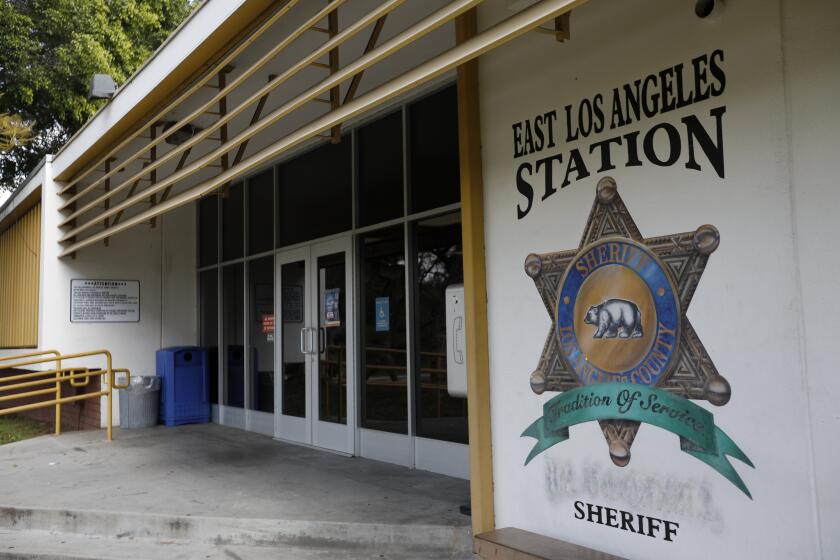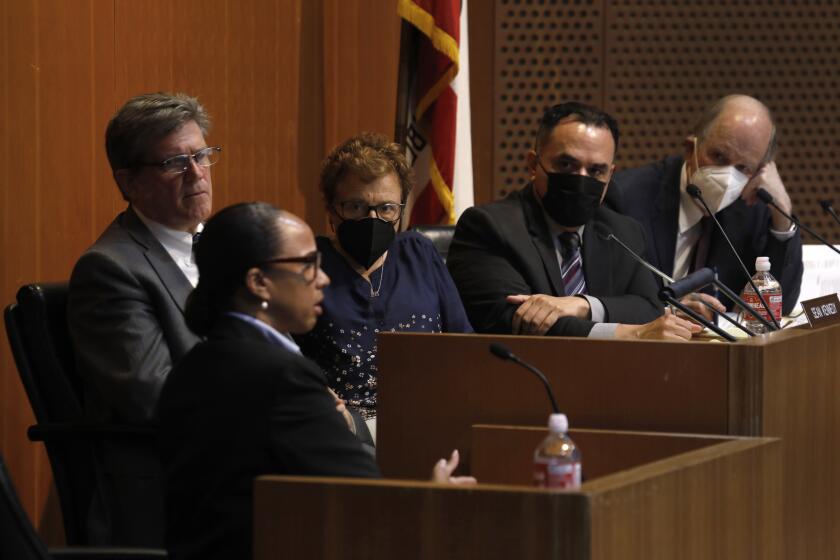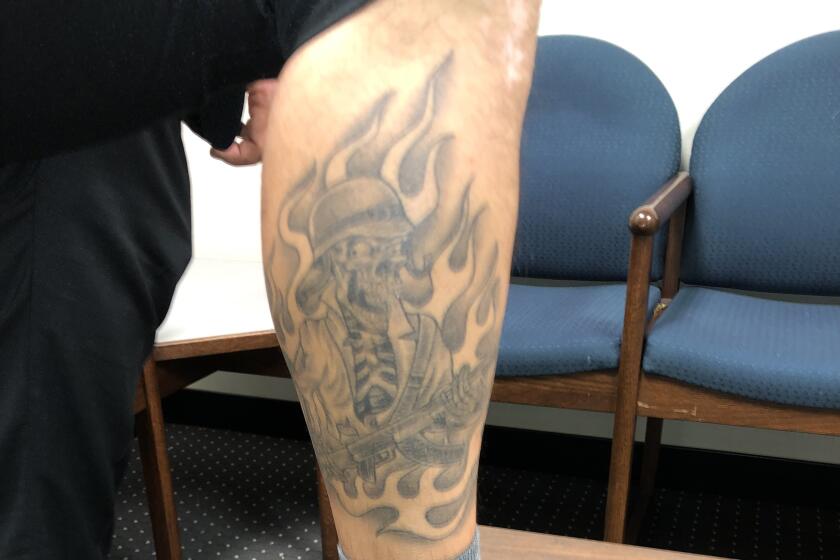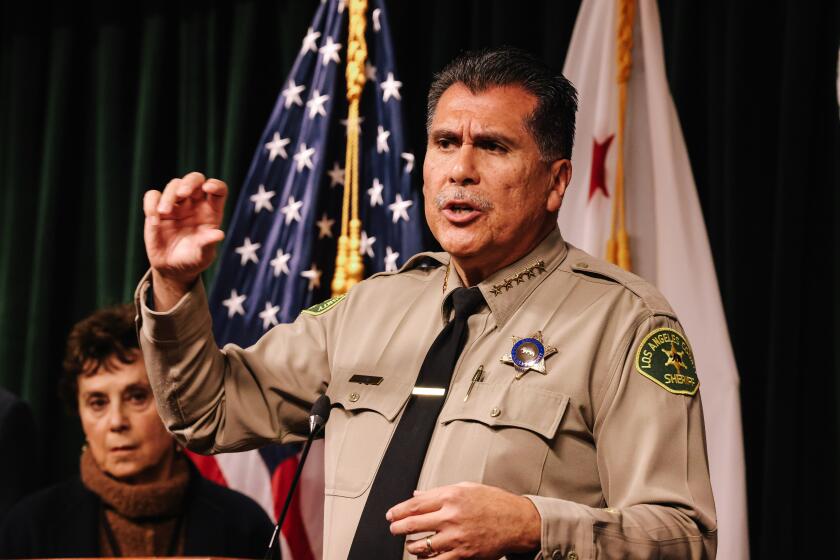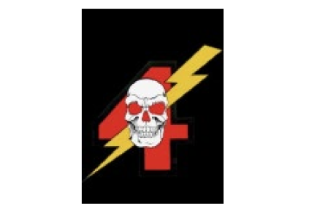Dozens of LASD deputies ordered to show suspected gang tattoos, reveal others who have them
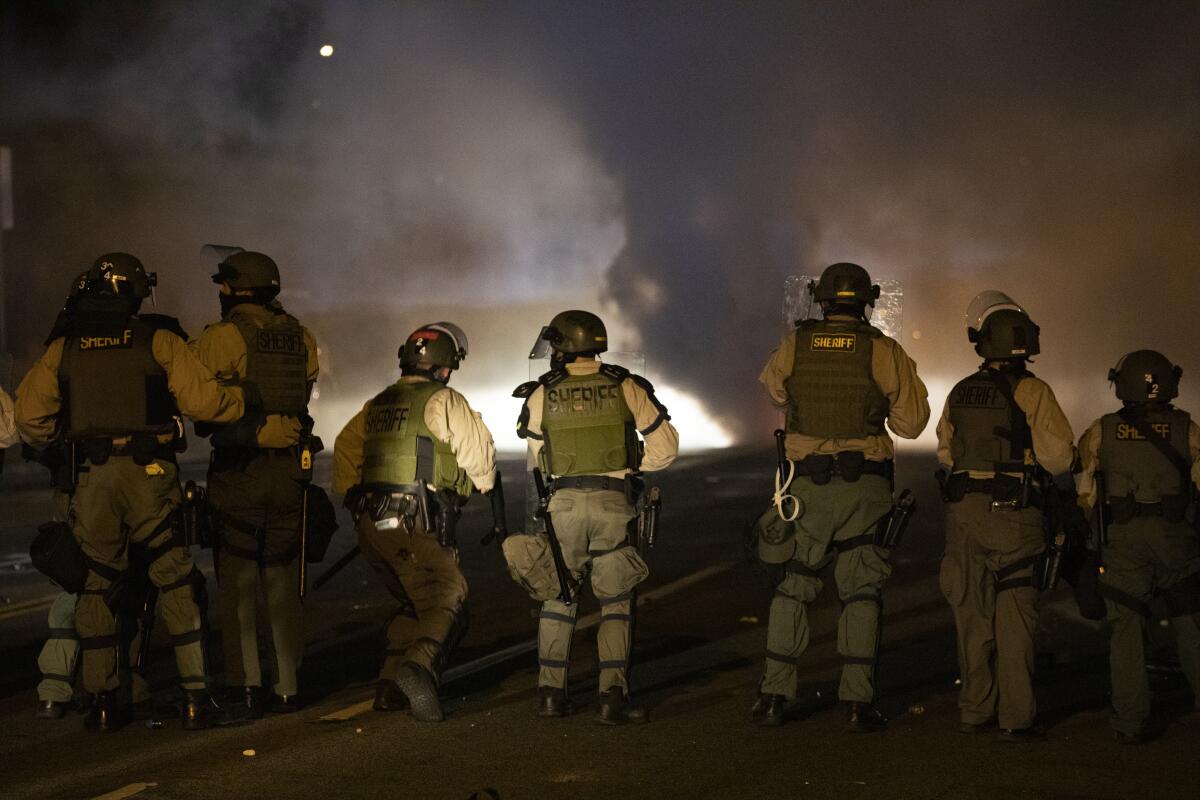
Nearly three dozen deputies have been ordered to come in for questioning, show their tattoos and give up the names of any other deputies similarly sporting ink connecting them to two of the Los Angeles County Sheriff Department’s most notorious deputy gangs.
The demand came Friday in a letter sent by county Inspector General Max Huntsman to 35 deputies suspected of being members of either the Executioners, which operates out of the Compton station, or the Banditos, which operates out of the East L.A. station.
The names of the deputies have not been released to the public, but Huntsman said they were a subset of the 41 deputies he identified as suspected gang members last year.
“The Los Angeles Sheriff’s Department conducted incomplete internal affairs investigations into the Banditos and Executioners, failing to identify all members,” Huntsman told The Times this week. “California’s new gang law addresses discrimination based on race and gender and gives inspectors general enhanced authority to collect evidence. We’re using that authority to complete the investigations by directing deputies to show their tattoos and tell us who else has them.”
Top watchdog for the L.A. County Sheriff’s Department has identified dozens of deputies who are allegedly members of gang-like groups that operate out of two stations.
It’s unclear what the consequences would be if deputies do not show up, though the letters Huntsman sent last week warned that refusing to answer questions could “adversely affect your employment with Los Angeles County or your status as a peace officer.”
In a mass text sent to members this week, one union representing deputies, the Los Angeles Sheriff’s Professional Assn., advised members to call the union immediately if they received a letter. In a Facebook post, another union, the Assn. for Los Angeles Deputy Sheriffs, advised members not to respond to the letters and to instead “call ALADS right NOW.”
Richard Pippin, ALADS president, said the union believes that some aspects of the inspector general’s investigation “infringe upon the fundamental constitutional rights of individuals” and that there are major parts of the letter that need clarification.
“Deputies will no doubt be looking to Sheriff [Robert] Luna, their employer, for that clarification,” he said.
In a statement late Tuesday, department officials said they were aware of the letters, but did not clarify whether deputies would be directed to respond or whether there would be consequences for ignoring them.
“The Department supports any investigation that seeks to uncover wrongdoing, since all members of the Sheriff’s Department are expected to hold themselves to the highest ethical and professional standards,” officials wrote in an unsigned statement sent by email. “Department members who engage in misconduct or criminal activity will not be tolerated and will be held accountable.”
A new study finds that 16% of L.A. County Sheriff’s deputies and supervisors said in an anonymous survey they’ve been asked to join a secret clique.
The five-page letter from the inspector general, the county’s watchdog, opens by explaining the recipient is “directed to appear in person to participate in an interview to be conducted by the Office of Inspector General concerning the presence of law enforcement gangs in the Los Angeles County Sheriff’s Department.”
It lays out the legal basis for such a probe, citing a 2021 state law that gave inspectors general the authority to investigate law enforcement gangs by specifying that agencies “shall cooperate” with inspector general investigations.
Though the law doesn’t specify what happens if an individual deputy doesn’t cooperate, Huntsman’s letter points to another section of the state’s penal code, which says that failing to cooperate with an investigation into police misconduct can be grounds for decertification of a peace officer.
Then the letter explains the reason for the investigation: Though the Sheriff’s Department has had evidence that secretive and exclusive deputy gangs commonly known as the Banditos and Executioners both exist, the department has never been able to provide investigators with a full list of the members in either group.
“The Office of Inspector General is conducting a series of witness interviews to establish the membership of the Banditos and the Executioners,” the letter continues.
A new report by the Civilian Oversight Commission condemned the “cancer” of violent deputy gangs in the Los Angeles County Sheriff’s Department and urged a ban on the secretive groups.
The letter lays out more than a dozen questions interviewers plan to ask, including: Do you have a tattoo related to the Banditos or the Executioners anywhere on your body? Who was present when you were tattooed? Who knows about your tattoo? Who else have you seen the tattoo on?
The letter also included a request to see each deputy’s legs, which are a common spot for suspected gang tattoos.
The letter ends by instructing recipients to contact the Office of the Inspector General within two weeks to schedule an interview.
Though the letter says deputies “must” appear and answer questions, it does lay out one possible exception: the 5th Amendment. If deputies assert their 5th Amendment right to refuse answering questions that could incriminate them, Huntsman’s office will not legally force them to answer — or at least not yet.
“Should the Office of Inspector General elect to compel a statement over a Fifth Amendment assertion, you will be recalled at a future date,” the letter states. “Absent an assertion by you of your Fifth Amendment right against self-incrimination, failure to answer may adversely affect your employment with Los Angeles County or your status as a certified peace officer.”
The deputies who received the letter — under a delivery process that Huntsman said was possible only because of cooperation from the Sheriff’s Department — were all among those referenced in a longer letter Huntsman sent to then-Sheriff Alex Villanueva in early 2022.
A Los Angeles County sheriff’s deputy associated with a gang-like group of deputies with matching tattoos testified that he has attended about seven “inking parties.”
The purpose of that earlier letter was to ask the department for an array of materials needed for the investigation. But it also laid out some of the information Huntsman already had about their existence.
While the letter didn’t name any gang members, it did say that the office had identified 11 suspected Banditos and 30 suspected Executioners.
The Sheriff’s Department has long faced allegations about secretive deputy groups running amok in certain stations and jails, controlling command staff and promoting a culture of violence. A Loyola Marymount University report released in 2021 identified 18 such groups that have existed over the last five decades, including the Executioners and the Banditos.
Members of the former are alleged to sport tattoos of a skull with Nazi imagery and an AK-47, while members of the latter are allegedly known for their matching tattoos of a skeleton outfitted with a sombrero, bandoleer and pistol.
The current round of letters comes on the heels of a series of efforts to curb gang activity within the Sheriff’s Department.
Shortly after taking office, Luna announced the creation of an Office for Constitutional Policing with the aim of eradicating deputy gangs.
Facing long-standing allegations of “appalling” conditions inside the county’s jails and violent deputy “gangs” operating on its streets, Sheriff Robert Luna announced a new office designed to combat those problems.
And, in a lengthy report released a few weeks later, the Civilian Oversight Commission’s special counsel offered more than two dozen recommendations to get rid of gangs, including firing captains who won’t support anti-gang policies, requiring deputies to hide any gang-related tattoos at work, notifying prosecutors whenever a gang-involved deputy is set to testify as a witness in court and holding community meetings.
Unlike his predecessor, Luna has acknowledged the existence of deputy gangs and publicly said he wants to end them. However, he has not yet formally accepted the report’s recommendations.
More to Read
Sign up for Essential California
The most important California stories and recommendations in your inbox every morning.
You may occasionally receive promotional content from the Los Angeles Times.
